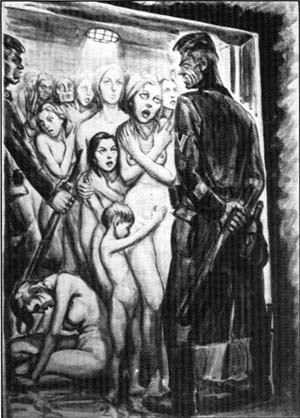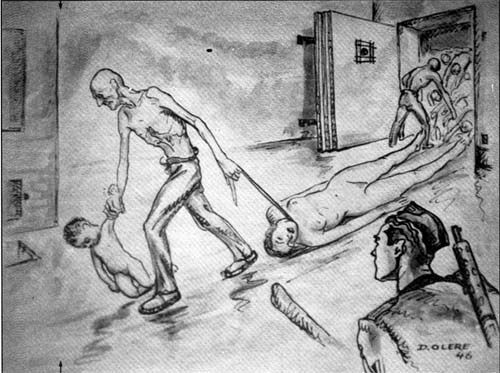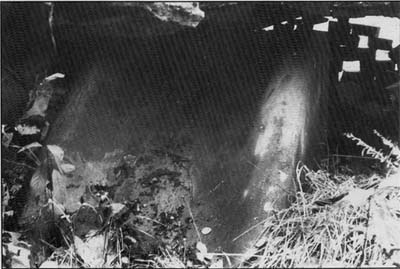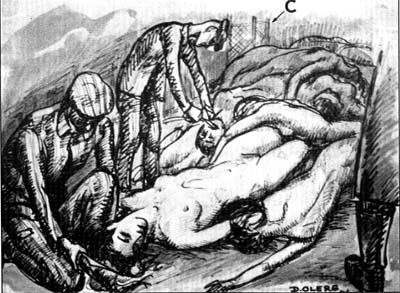|
|
 |
 |
AUSCHWITZ:
Technique
and Operation
of
the Gas Chambers © | |
|
| |
 |
Back |
 |
Contents |
Page 493 |
 |
Home
Page |
Forward |
 |
| |
 |
Document
29.
|
|
| Document 29. |
| Indian ink sketch by
David Olère, dated 1950, showing women and children just before
their extermination in the gas chamber of Krematorium III. Leaving
aside the emotive aspect, this sketch is TOO LATE to be historically
acceptable. It has become allegorical and contains obvious errors
that can be identified by comparison with “The extraction of the
gassed”, dating from 1946. The gas chamber door is shown opening
inwards, whereas in fact it opened outwards. Even the position of
the door is incorrect. The lamps are incorrectly placed — they were
actually located on either side of the central supporting were beam,
which is not even shown. No pillars are visible, either structural
or latticed.The faces of the SS men,with their shaved necks, are
caricatures as compared with the young “pure bred” SS man with wavy
hair shown on the 1946 drawing, and contrast with the angelic faces
of the women, the majority of whom are of “Aryan” appearance.
according to the criteria of the Third Reich. I present this scene
to show how the visual memories of a survivor deteriorate with time.
Only Olère's early pictures, from 1945 to 1947, are historically
valid, having the truth of photographs, even if not their absolute
precision. Oléres paintings of Birkenau, produced much later,
reflect this deterioration of the visual memory.
|
|
| Document 30
(sketch) |
 |
| |
Document 30 (sketch)
(above) and 30a (photo): (below) |
| |
|
| Sketch by David Olère,
dating from 1946, showing bodies being removed from the Kematorum
III gas chamber. As confirmed by known photographs, the door is
correcttly hung and located. The fragment of furnace shown on the
left, beyond the two arrows, is purely symbolic (there was no
furnace in the basement) and spoils a scene which would have been
irreproachable without this addition “to make it better”. Between
the door and the prisoner in the foreground there was a wall of
planking blocking off the corpse chute (still visible in the ruins
of Krematorium III. The photo by the author, below the sketch. shows
its upper extremity), not used because it was built to serve real
morgues, not what had become: an undressing room and gas chamber.
The total absence of this chute even in David Olères early memories
confirms that it was never used. |
|
 |
Document 30a
(photo) |
|
| Document 31 |
 |
|
| Document 31: |
| Sketch by David Olère, dating from 1946, showing a
“barber” (in the the Foreground) and “dentist” (in the middleground)
at work on bodies INSIDE the Krematorium III gas chamber, as shown
by a wire mesh Zyklon-B introduction column [C] in the background.
It should be noted that the SS probably considered that the
extracction of gold teeth should be done immediately on opening the
gas chamber in order to avoid the “organized losses” that could
occur over the short distance from the basement to the ground
floor | |
| |
AUSCHWITZ:
Technique
and operation
of the gas chambers
Jean-Claude Pressac
© 1989, The
Beate Klarsfeld Foundation |
 |
Back |
Page 493 |
Forward |
 |
|

